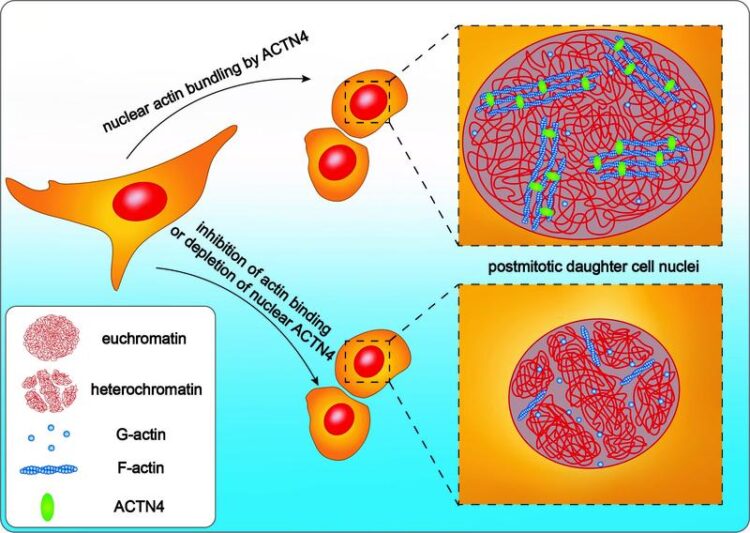Researchers discover a mechanism that causes cell nuclei to grow

Two cell nuclei after division: At the top, fibers of actin are bundled with the aid of the protein Alpha-Actinin 4 (ACTN4) in the nucleus. Below, ACTN4 is inhibited or entirely absent.
Graphic: Robert Grosse/Ulrike Endesfelder
By far the most important process in cell development is how cells divide and then enlarge in order to multiply. A research team headed by Freiburg medical scientist Prof. Dr. Robert Grosse has now discovered that bundled fibers of actin within a cell nucleus play an important part in how they enlarge after division.
Fibers of the structural protein actin stabilize the outer form of the cell and transport substances into a cell. The mechanisms that influence the growth of the cell nucleus after division were less well known by scientists. The researchers have published their results in the journal ‘EMBO reports’.
After dividing, cell nuclei have to grow in order to reorganize and unpack the genetic information in chromatin, the basic genetic material, and so process and read it. With this work the scientists show that bundled fibers of actin – which are normally responsible for exercising force – work within the cell to expand the nucleus. Using a video microscope the researchers have measured in living cells how cell nuclei enlarge immediately after division. In order to observe the fibers of actin and skeletal structures in the cell nucleus, they also used a high-resolution super-resolution microscope.
In the future Grosse and his team want to clarify whether mechanical forces work within the cell nucleus to re-organize them to sort the genetic information. If so, this process could for example be disrupted or changed in tumor cells or play a part in stem cells.
Freiburg medical scientist Robert Grosse is a professor of Pharmacology and Toxicology and director of Division I at the Institute of Experimental and Clinical Pharmacology and Toxicology, as well as a member of the Cluster of Excellence CIBSS – Centre for Integrative Biological Signalling Studies at the University of Freiburg. His team is working with a group headed by Dr. Ulrike Endesfelder from the Max Planck Institute for Terrestrial Microbiology in Marburg, which is contributing expertise in super-resolution microscopy.
Original publication:
Krippner, S., Winkelmeier, J., Knerr, J., Brandt, D. T., Virant, D., Schwan, C., Endesfelder, U. & Grosse, R. (2020). Post-mitotic expansion of cell nuclei requires nuclear actin filament bundling by a-actinin 4. In EMBO reports, DOI: 10.15252/embr.202050758
Contact:
Prof. Dr. Robert Grosse
Institute of Experimental and Clinical Pharmacology and Toxicology
University of Freiburg
Tel.: +49 761 203-5301
e-mail: robert.grosse@pharmakol.uni-freiburg.de
Originalpublikation:
https://www.embopress.org/doi/full/10.15252/embr.202050758
Weitere Informationen:
https://www.pr.uni-freiburg.de/pm-en/press-releases-2020/divide-and-enlarge?set_language=en
Media Contact
All latest news from the category: Life Sciences and Chemistry
Articles and reports from the Life Sciences and chemistry area deal with applied and basic research into modern biology, chemistry and human medicine.
Valuable information can be found on a range of life sciences fields including bacteriology, biochemistry, bionics, bioinformatics, biophysics, biotechnology, genetics, geobotany, human biology, marine biology, microbiology, molecular biology, cellular biology, zoology, bioinorganic chemistry, microchemistry and environmental chemistry.
Newest articles

Security vulnerability in browser interface
… allows computer access via graphics card. Researchers at Graz University of Technology were successful with three different side-channel attacks on graphics cards via the WebGPU browser interface. The attacks…

A closer look at mechanochemistry
Ferdi Schüth and his team at the Max Planck Institut für Kohlenforschung in Mülheim/Germany have been studying the phenomena of mechanochemistry for several years. But what actually happens at the…

Severe Vulnerabilities Discovered in Software to Protect Internet Routing
A research team from the National Research Center for Applied Cybersecurity ATHENE led by Prof. Dr. Haya Schulmann has uncovered 18 vulnerabilities in crucial software components of Resource Public Key…





















